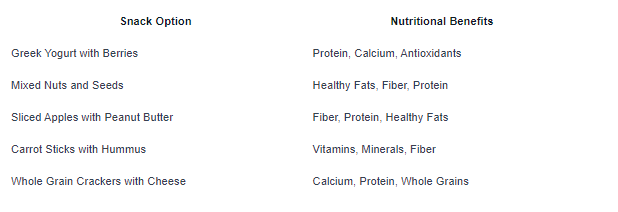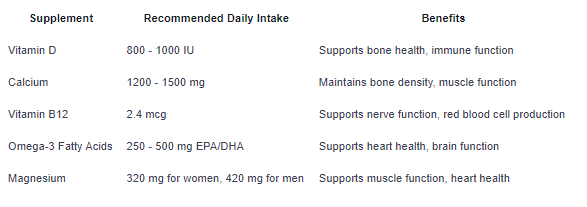Healthy Eating Tips for Seniors
February 13, 2025
Unlock the top 10 healthy eating tips for seniors to thrive! Enhance your nutrition game for a vibrant life!


Senior Nutrition Matters
When it comes to the well-being of older adults, healthy eating plays a vital role in maintaining overall health and quality of life. Let's delve into the importance of healthy eating for seniors and the various factors that can impact their nutritional needs.

Importance of Healthy Eating for Seniors
As individuals age, their nutritional needs and dietary requirements evolve. Healthy eating is particularly crucial for seniors as it helps support their immune system, maintain muscle mass, improve cognitive function, and reduce the risk of chronic diseases such as cardiovascular conditions and osteoporosis. Consuming a well-balanced diet rich in essential nutrients is key to promoting longevity and enhancing the overall well-being of older adults.
Factors Affecting Senior Nutrition
Several factors can influence the nutritional status of seniors, making it essential to pay close attention to their dietary habits. Factors such as changes in metabolism, decreased appetite, dental issues, medication interactions, and mobility limitations can all impact the dietary choices and nutrient absorption of older adults. It's important to address these factors and tailor dietary recommendations to meet the individual needs of seniors for optimal health outcomes.
Understanding the significance of healthy eating for seniors and acknowledging the various factors that can affect their nutritional intake are fundamental steps towards promoting a well-rounded approach to senior nutrition. By prioritizing healthy eating habits and addressing specific nutritional requirements, older adults can lead vibrant and fulfilling lives as they age gracefully.
Top 10 Vital Healthy Eating Tips for Seniors
In the realm of senior nutrition, implementing healthy eating habits is paramount for overall well-being. Below are ten essential tips designed to guide seniors towards a balanced and nutritious diet:

Tip 1: Balancing Nutrients
Achieving a well-rounded diet by including a variety of nutrients is crucial for senior health. Opt for a mix of carbohydrates, proteins, healthy fats, vitamins, and minerals to support overall vitality.
Tip 2: Hydration is Key
Staying hydrated is essential for seniors to maintain proper bodily functions. Aim to consume an adequate amount of water throughout the day and consider incorporating hydrating foods like fruits and vegetables.
Tip 3: Embracing Whole Foods
Prioritize whole foods such as fruits, vegetables, whole grains, lean proteins, and dairy products in your diet. These nutrient-dense foods provide essential vitamins and minerals for optimal health.
Tip 4: Watching Portion Sizes
Being mindful of portion sizes can help prevent overeating and promote weight management. Use smaller plates, measure serving sizes, and listen to your body's hunger cues to maintain a healthy intake.
Tip 5: Including Fiber in Your Diet
Fiber plays a crucial role in digestive health and can help prevent constipation, a common issue among seniors. Incorporate fiber-rich foods like whole grains, fruits, vegetables, and legumes into your meals.
Tip 6: Limiting Processed Foods
Reduce your intake of processed foods high in added sugars, unhealthy fats, and sodium. Opt for fresh, whole ingredients to minimize the consumption of preservatives and artificial additives.
Tip 7: Prioritizing Lean Proteins
Include lean protein sources such as skinless poultry, fish, beans, legumes, and tofu in your meals. Protein is essential for muscle maintenance, immune function, and overall health in seniors.
Tip 8: Monitoring Sodium Intake
Excessive sodium intake can contribute to high blood pressure and other health issues. Be mindful of hidden sources of sodium in packaged foods and opt for low-sodium alternatives when possible.
Tip 9: Incorporating Fruits and Vegetables
Fruits and vegetables are rich in vitamins, minerals, antioxidants, and fiber. Aim to include a colorful array of produce in your diet to boost immunity, support digestion, and reduce the risk of chronic diseases.
Tip 10: Being Mindful of Sugar and Saturated Fats
Limit your intake of foods high in added sugars and saturated fats, as they can contribute to weight gain and increase the risk of heart disease. Opt for natural sweeteners and healthy fats from sources like nuts, seeds, and avocados.
By following these ten vital healthy eating tips, seniors can prioritize nutrition, promote overall health, and enhance their quality of life. Remember that making small, sustainable changes to your diet can have a significant impact on your well-being as you age.
Meal Planning for Seniors
Incorporating balanced meals and nutritious snacks into a senior's daily diet is essential for promoting overall health and well-being. When it comes to meal planning for seniors, focusing on building a balanced plate and choosing healthier snack options can make a significant difference in their nutritional intake.

Building a Balanced Plate
Creating a balanced plate for seniors involves incorporating a variety of nutrient-dense foods from different food groups. The following table outlines a general guideline for building a balanced plate for seniors, ensuring they receive essential nutrients for optimal health:

By including a combination of fruits, vegetables, whole grains, lean proteins, and dairy products, seniors can maintain a well-rounded diet that supports their nutritional needs. It's important to pay attention to portion sizes and aim for a colorful plate to ensure a diverse range of nutrients.
Snack Ideas for Healthier Choices
Snacking can be an important part of a senior's diet, providing additional nutrients and energy throughout the day. When selecting snacks for seniors, it's crucial to opt for healthier choices that offer both taste and nutrition. Here are some snack ideas tailored for seniors:

Encouraging seniors to choose nutrient-dense snacks like yogurt, nuts, fruits, and vegetables can help them stay satisfied between meals and meet their daily nutritional requirements. These healthier snack options offer a balance of macronutrients and micronutrients, contributing to overall wellness and vitality.
By focusing on building balanced plates and selecting nutritious snacks, seniors can enjoy a diverse and fulfilling diet that promotes good health and supports their nutritional needs as they age. Incorporating these meal planning strategies can help seniors maintain their well-being and quality of life through proper nutrition.
Special Considerations for Senior Nutrition
As individuals age, their nutritional needs may change, requiring special considerations to ensure optimal health and well-being. Two key aspects to focus on when addressing nutrition for seniors are dietary supplements and consultations with healthcare providers.
Dietary Supplements for Seniors
Dietary supplements can play a vital role in supporting the nutritional needs of seniors. As aging bodies may have difficulty absorbing certain nutrients from food alone, supplements can help bridge the gap and prevent deficiencies. Below are common dietary supplements recommended for seniors:

It's important for seniors to consult with their healthcare providers before starting any new supplements to ensure they are safe and appropriate for their individual needs. A healthcare professional can assess dietary intake, health conditions, and medication interactions to determine the most suitable supplement regimen.
Consulting Healthcare Providers
Regular consultations with healthcare providers are essential for seniors to manage their nutritional needs effectively. Healthcare professionals, including doctors, dietitians, and nutritionists, can provide personalized guidance on dietary requirements, meal planning, and lifestyle modifications tailored to specific health conditions and goals.
By engaging in open and honest discussions with healthcare providers, seniors can address any concerns related to their nutritional status, receive recommendations for dietary modifications, and monitor their overall health and well-being. Healthcare providers can also help seniors navigate any challenges or barriers to healthy eating, ensuring they maintain a balanced and nourishing diet throughout their golden years.
Incorporating dietary supplements under the supervision of healthcare providers and seeking regular guidance from them are essential components of senior nutrition management. By prioritizing these special considerations, seniors can enhance their quality of life, maintain their independence, and promote longevity through healthy eating habits.
Promoting Healthy Eating Habits
Creating and maintaining a supportive environment for seniors is essential for promoting healthy eating habits. By fostering an atmosphere that emphasizes nutritious food choices and encourages social engagement, seniors can improve their overall well-being. Here are two key strategies to promote healthy eating habits among seniors:
Creating a Supportive Environment
A supportive environment plays a significant role in shaping seniors' dietary choices. This includes making healthy foods easily accessible and creating a pleasant dining atmosphere. Here are some ways to create a supportive environment for seniors:
Strategies for a Supportive Environment
Stocking the kitchen with fresh fruits and vegetables
Organizing meal prep and cooking activities
Providing easy-to-reach healthy snacks
Ensuring proper lighting and seating at the dining area
Establishing a routine for meals and snacks
By implementing these strategies, seniors can feel empowered to make better food choices and maintain a nutritious diet.
Encouraging Social Meals and Activities
In addition to the physical environment, social interactions and activities play a crucial role in promoting healthy eating habits among seniors. Eating meals in a social setting can enhance seniors' enjoyment of food and encourage them to make healthier choices. Here are some ways to encourage social meals and activities:
Ideas for Social Meals and Activities
Organizing group cooking classes or potluck dinners
Planning regular outings to farmers' markets or community gardens
Hosting themed meal nights with friends or family members
Facilitating discussions on nutrition and healthy eating habits
Encouraging participation in group exercise or fitness classes
Engaging in social meals and activities not only provides seniors with emotional support but also fosters a sense of community and camaraderie. By promoting social interactions around food, seniors can develop positive eating habits and maintain a healthy lifestyle.
Sources
https://www.ncoa.org/article/healthy-eating-tips-for-seniors/
https://www.healthline.com/health/healthy-eating-for-seniors













